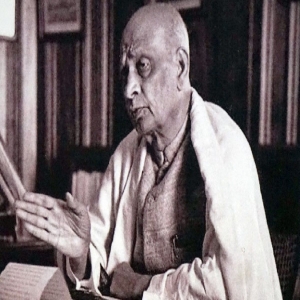
 Pachu Menon
Pachu Menon
.jpg)
Although Sardar Vallabhbhai Patel, widely acclaimed as the architect of modern India, had a nuanced view of language and the formation of states, he nonetheless recognised the importance of popular sentiments in shaping state boundaries.
His initial reservation against the formation of linguistic states in India stemmed from concerns about potential fragmentation and regionalism.
It, however, appears now that the great stalwart's apprehensions over such divisions undermining national unity were not entirely unfounded!
The idea that people of this great nation think of themselves as owing allegiance to their respective states rather than the nation as a whole is slowly gaining ground.
Now, more than ever, the concepts of 'sons-of-the-soil,' which have come into the public domain for debates and discussions, hint at a shade of strong identification with a particular region of the country.
The term 'outsiders,' once loosely coined for migrants, has now become a dominant and prevalent force in shaping people's perceptions about those from other states but residing locally.
As a unique characteristic that reflects its harmonious coexistence of various cultures, languages, religions, and traditions across its vast geographical expanse, the country's 'unity in diversity' comes across as that binding factor which holds the nation together.
Understanding that language is an integral part of culture as it serves as a primary means of communication, shaping cultural norms and beliefs, it does appear painful to have a particular language being thrust on those who are not well-versed with the tongue but are being asked to comply with the 'norm' by virtue of their domicile in that state.
The parochial brand of politics has yielded rich electoral dividends for regional dispensations seeking to challenge the more dominant national parties in various states.
Prioritisation of regional identity, which these days translates as a stronger loyalty and attachment to one's region compared to the nation as a whole, has, however, led to a peculiar situation.
Let us not forget that we are one people on one soil.
It is indeed unfortunate that today, the integrity of the nation is threatened by the divisive forces of regionalism, communalism, and linguism.
Besides the 'outsider' syndrome that is manifesting itself in various forms in many regions across the country, language discrimination has reared its ugly head in more visible ways in recent times.
The recent developments in Karnataka portend an alarming situation, which, if not addressed promptly, will set a precedent for similar acts across the country.
Every state in the country cherishes its own language and is deeply committed to its propagation. But intimidating people for not speaking in the local language is, however, a strange way to assert one's xenophobic feelings!
The call by a regional party leader to slap anyone who doesn't speak the regional language of the state, for instance!
At the same time, in many states in India, disrespect towards the local language is taken very seriously. This sensitivity stems from the fact that language is not just a means of communication but a marker of cultural identity and heritage.
During a concert at East Point College in Bengaluru, Bollywood singer Sonu Nigam paused his performance after a group rudely demanded he sing in Kannada. His on-stage outburst sparked outrage, with an FIR filed against him for allegedly insulting 'Kannadigas.'
A fan's request for a Kannada song led to Nigam refusing to sing in Kannada and making a controversial comparison to the Pahalgam attack, which quickly went viral and drew sharp criticism from all quarters, including the Kannada film industry.
The singer's apology over the 'unfortunate' incident notwithstanding, pro-Kannada groups have filed complaints accusing him of hurting the state's cultural pride and incitement of hatred.
For that matter, people anywhere in India take umbrage at any show of disrespect towards the local language. This sensitivity stems from the fact that language is not just a means of communication but a marker of cultural identity and heritage.
Coming close at the heels of the Sonu Nigam incident, when the State Bank of India manager of the Surya Nagar branch in Anekal taluk of Karnataka refused to speak in Kannada during an interaction with a customer, she was forced to eat her words and issue a video apology, that too in Kannada.
In another incident, an Airtel store employee in Mumbai refused to speak Marathi with a customer, suggesting that they communicate in Hindi instead, sparking a debate about language usage and the importance of the local language for respective states.
Such situations, besides striking a raw nerve, tend to spark public outrage, political intervention, and an apology.
An author of a Human Resources newsletter opines that these moments, caught on camera and shared widely, were not mere customer service missteps but cultural flashpoints.
"They have now sparked urgent conversations in boardrooms about the importance of language sensitivities, workplace diversity, and the fine art of balancing regional pride with national unity." (HRKatha)
At the same time, HR professionals are unanimous in their opinion that organisations should aim to hire employees who are proficient in at least two languages – one being English or Hindi and the other, the regional language of the location.
By virtue of being a Republic, the Constitution of India guarantees its citizens the freedom to move freely throughout its territory and reside in any part of the country.
The higher minimum wages and comparatively better living conditions that the state offers have been attracting a huge influx of Bengali migrant workers to Kerala for well over a decade now.
The increased interaction and longer stays have helped them closely integrate into the local social structure. Their willingness to learn Malayalam has further helped them adapt to and become a part of a new culture and environment.
For that matter, it is observed that migrants often become fluent in the local language over time, and this fluency can greatly impact their integration and success in their new communities.
The dislike of speaking in one's native language stems from a variety of reasons.
Although a nuanced issue, it is usually the white-collar migrant workers who tend to prioritise their own language or English. With Hindi and English being widely used in business or professional settings, a tendency to rely more on them is quite normal.
Learning the local language comes with its own set of benefits! Let us, however, remember that India's vast and diverse linguistic landscape fosters connectivity and understanding across borders and cultures.
English has a significant acceptance in India due to a combination of historical factors, its role as a bridge language, and its importance in education and employment.
We need to understand that regional languages alone cannot entirely close the bridge created by English. But yes, they can play a significant role in fostering a more inclusive and equitable multilingual society.
While English serves as a valuable link for global communication and access to higher education, especially in fields like science and technology, promoting regional languages is crucial for preserving cultural diversity and ensuring that all citizens have equal opportunities.
However, despite being adopted as the Official Language of India, Hindi is not naturally accepted as a native tongue across India, especially in the southern states. The aversion for Hindi in Tamil Nadu is well-known!
Several Indian states have voiced opposition to the idea of a single national language, particularly Hindi, and have advocated for the preservation of their own language and linguistic diversity.
A bill passed by the Kerala Assembly ten years ago, during the tenure of the United Democratic Front (UDF) government, aimed to promote and nurture the Malayalam language and make it the sole official language in Kerala. However, it was recently denied assent by President Droupadi Murmu without citing any reason.
Currently, the Official Languages Act of 1969 recognises Malayalam or English as the official language of the state.
Some states feel that using their native language in government and official business is crucial for promoting their unique heritage and identity.
Moreover, with regional pride increasingly coming to the fore, particularly in the context of the country's diverse linguistic, cultural, and historical identities, it is assured that instances of disrespect for one's native language will continue to elicit a severe backlash in India.